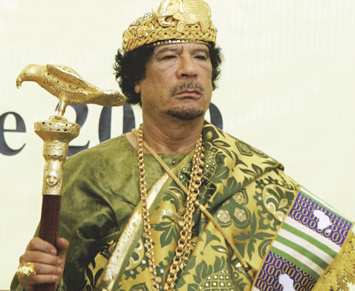Libyan leader Muammar Gadhafi went from “a model” and “important ally” for Europe and America to a regime change target in just a few years. Little has been reported in the Western press about Gadhafi ’s new plan for Africa, which included an African currency backed by gold and no more dependent on the U.S. dollar.
That desire for a true, strong African currency was one of the reasons the U.S. and Western powers set out to kill the revolutionary leader.
Gadhafi desired to create a single gold-backed African currency called the Gold Dinar.

Former Libyan leader Muammar Gadhafi
|
Peter Koenig, a renowned economist, geopolitical analyst and former World Bank employee, said during a recent interview that Gadhafi was certainly not killed in 2011 for humanitarian reasons, or for killing his own people, but because he wanted to empower Africa.
Gadhafi was in the process of creating an entirely new banking system for the continent, which potentially would take power out of the hands of Western former colonial powers and deal a serious blow to the U.S. dollar-based monetary system.
“He (Gadhafi ) had a plan to create a new African Union, based on a new African economic system. He wanted to introduce the Gold Dinar to back African currencies, so they could become free from the dollar. He wanted to protect Africa’s vast natural resources from Western looting. The imperialists eliminated him,” said Koenig.
According to NewEra, a publication based in Namibia, Gadhafi wanted to “detach his oil sales from the U.S. dollar, which would mean no more trading hydrocarbons in U.S. dollars.” In the early 1970s, the Organization of Petroleum Exporting Countries (OPEC) ruled that oil should be traded in U.S. dollars.
NewEra reported that Gadhafi believed that if he detached Libya from the U.S. dollar other African and Middle Eastern oil and gas producers would follow suit. “In fact, Iran already hatched a plan in 2007 to introduce the Tehran Oil Bourse, where anyone could trade hydrocarbons in currencies other than the U.S. dollar.”
Iran’s plans came to a sudden halt when the U.S. began accusing Iran of harboring weapons of mass destruction, an accusation that was never verified but confirmed by “the 16 most prominent U.S. security agencies.”
Libya’s potential to bring down the U.S. dollar, and by extension the world’s monetary system, prompted French President Nicolas Sarkozy to have reportedly called Libya a “threat” to the world’s financial security.’
“Any move such as that would certainly not be welcomed by the power elite today, who are responsible for controlling the world’s central banks,” noted financial analyst Anthony Wile, editor of the free market-oriented Daily Bell, in 2011. “So yes, that would certainly be something that would cause his immediate dismissal and the need for other reasons to be brought forward (for) removing him from power.”
According to Wile, in the eyes of economists, Gadhafi ’s plans would have positively strengthened the whole continent of Africa, not to mention African investors.
That doesn’t mean that creating an African currency doesn’t have challenges.
“Africa has a lot to offer the world. In fact, as of 2016, only a fifth of our exports were traded on the continent while the rest, 80 percent were sent overseas. All things being equal, a common continental currency would have a strong value considering the world’s dependency on Africa for commodities,” said Claudia Boamah recently. She is an economic analyst at Capricorn Asset Management.
Boamah also points out that demand for currency is the driving force behind its appreciation, or growth in value. In other words, the more a country has to offer the world, the more the world needs that particular country’s currency.
Klaus Schade, a research associate at the Economic Association of Namibia, argued before thinking about a continent-wide currency, Africa needs to close the gap between upper and middle-income countries. He told Namibia’s NewEra, a first step would include “regional and continental integration with a strong focus on harmonization of customer procedures, standards, investment in infrastructure (transport, finance, communication, electricity, water etc.) in order to create new and expand current economic activity.”
Before considering a African currency, the continent should learn from the experience of others like the European Union, he added. As Africa currently stands, according to Schade, its economies aren’t diversified and competitive enough. Some of the obstacles include inconvertible African currencies, he said. “It would take quite a while, before markets would accept an African currency. The value of other currencies (USD, EUR, Swiss Franc, Chinese Yuan, CNY, etc.) would only be affected if the African currency were regarded as a safer haven,” he said.
Another obstacle, Boamah, said is an appreciating currency might not be received well by the financial world. “A currency for which there may very well be a strong demand and consequently strong value might not be received well by those whose currencies currently dominate world trade.”
Still, if Africa is to be truly free, intra-continental trade and working on a currency are critical— and the movement should continue.
Follow @jehronmuhammad on Twitter.